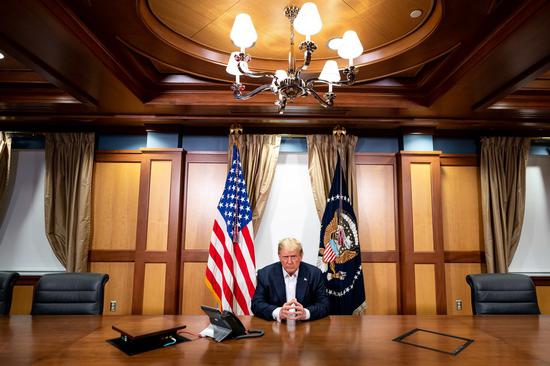
Image provided by the White House shows U.S. President Donald Trump participating in a phone call with Vice President Mike Pence, Secretary of State Mike Pompeo, and Chairman of the Joint Chiefs of Staff General Mark Milley from a conference room at Walter Reed National Military Medical Center in Bethesda, Maryland, the United States, on Oct. 4, 2020. (Tia Dufour/The White House/Handout via Xinhua) U.S. President Donald Trump has completed the therapy for his COVID-19 infection, his doctor announced on Thursday. Trump's "physical exam has remained stable and devoid of any indications to suggest progression of illness" since returning to the presidential residence on Monday after three days in hospital, White House physician Sean Conley said in a new memo. "Overall he's responded extremely well to treatment, without evidence on examination of adverse therapeutic effects," Conley wrote. Trump tested positive for COVID-19 on Oct. 1 and the coming Saturday would be day 10 since the diagnosis. "Based on the trajectory of advanced diagnostics the team has been conducting, I fully anticipate the President's safe return to public engagements at that time," Conley said. After infection, Trump experienced a high fever and two drops in his oxygen level. He was given the antiviral medication Remdesivir, anti-inflammatory steroid dexamethasone and an experimental antibody cocktail produced by U.S. drug maker Regeneron during his treatment. The doctor said that, as of Thursday afternoon, Trump's heart rate was 69 beats per minute, his blood pressure 127/81 mmHg, his respiratory rate 15-17 breaths per minute and his pulse oximetry showed a blood oxygen level of 96-98 percent with room air. However, the White House has repeatedly refused to disclose when Trump last had a negative test result. Trump, who's seeking reelection and is trailing 2020 Democratic presidential nominee Joe Biden in polls, has been eager to get back to work and resume rallies. He worked from the Oval Office on Wednesday and Thursday despite concerns that he may still be contagious. The Centers for Disease Control and Prevention recommends that individuals self-isolate for at least 10 days after the onset of symptoms from COVID-19, which has infected about 7.6 million people and killed more than 212,000 in the United States. |